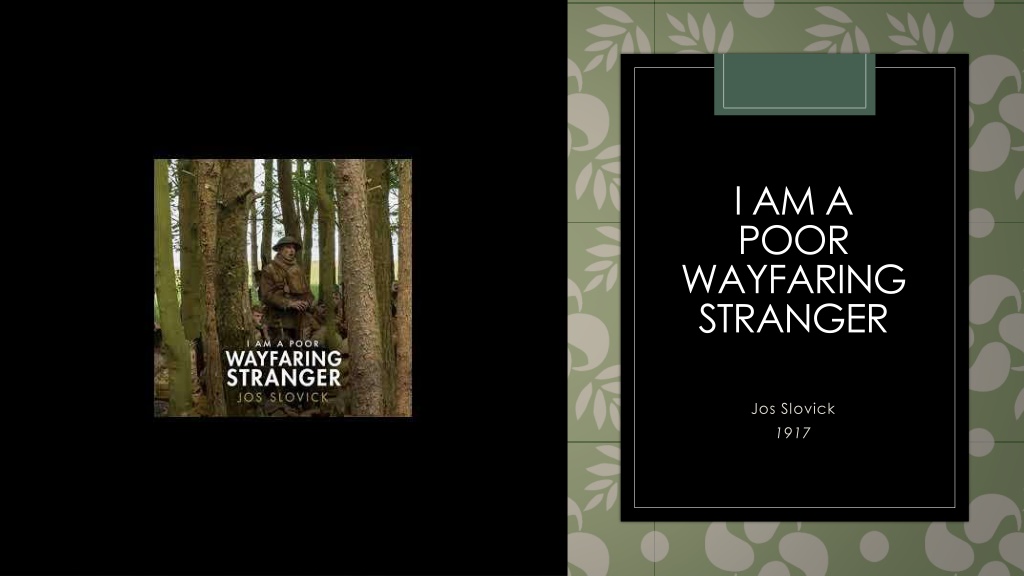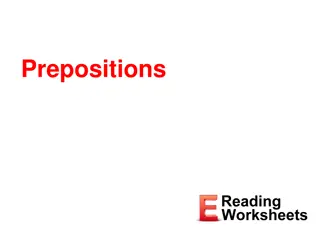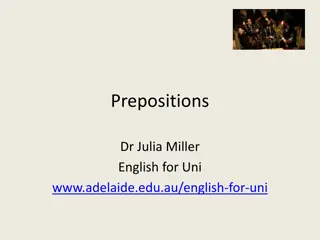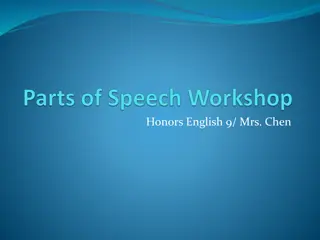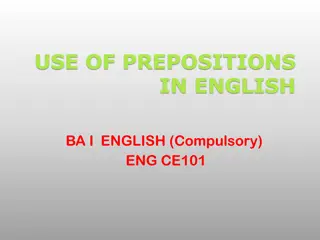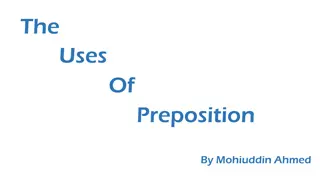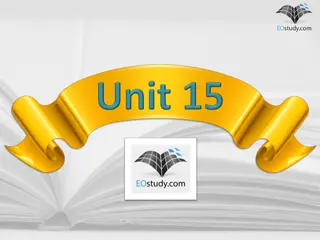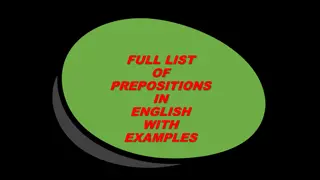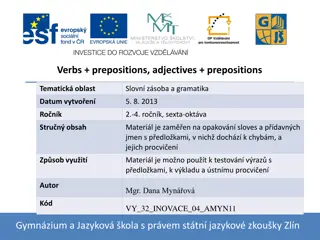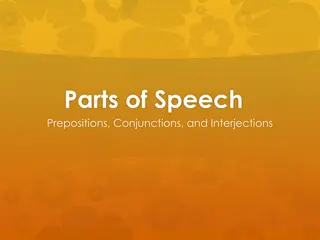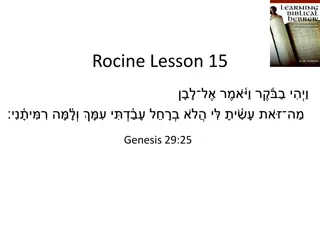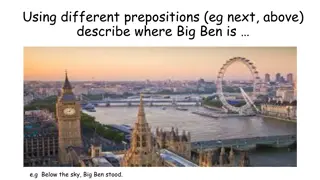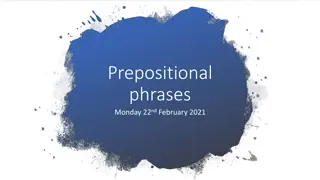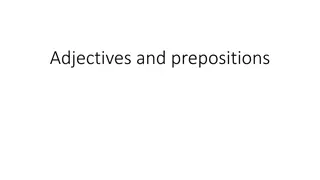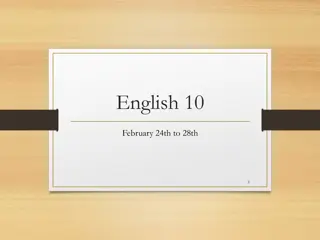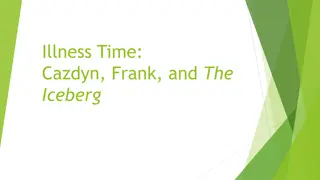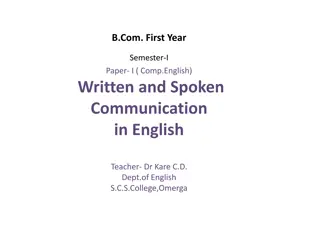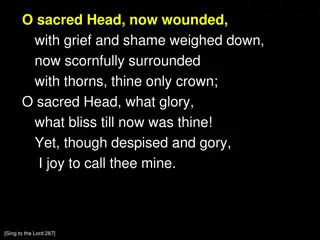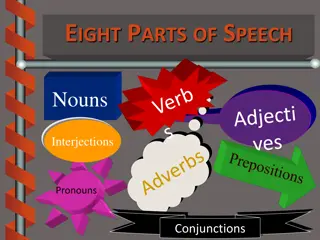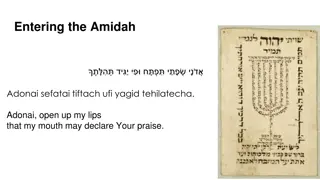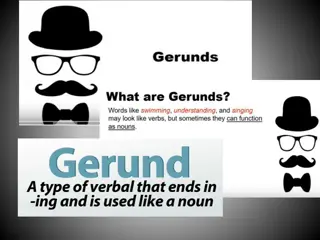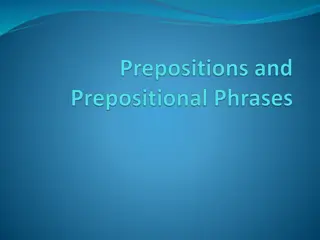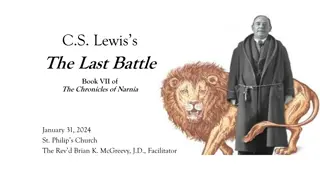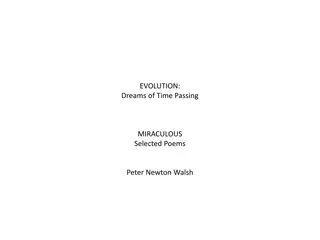Reflections on Contemplation and Prepositions
Explore the themes of contemplation, warning, and the power of prepositions through a series of thought-provoking images and excerpts from Julius Caesar. Delve into the significance of learning from history, paying attention to warnings, and understanding the importance of linguistic elements in communication.
Download Presentation

Please find below an Image/Link to download the presentation.
The content on the website is provided AS IS for your information and personal use only. It may not be sold, licensed, or shared on other websites without obtaining consent from the author. Download presentation by click this link. If you encounter any issues during the download, it is possible that the publisher has removed the file from their server.
E N D
Presentation Transcript
I AM A POOR WAYFARING STRANGER Jos Slovick 1917
Contemplation of the Week "To have in contemplation to intend or purpose, or to have under consideration." Contemplation: The act of mind in considering with attention; meditation; study; continued attention of the mind to a particular subject. Why do we continue to ignore repeated warnings (consciously or subconsciously) about what may happen in the future? Why do we ignore the past, which could warn us of the present or the future?
REPETITO MATER MEMORIA What happened in Act II? This Photo by Unknown author is licensed under CC BY-SA-NC.
Julius Caesar Act III: Scene I The soothsayer warns Caesar again. Artemidorus also tries to warn Caesar, but he brushes him off. Metellus Cimber presents a petition to Caesar: he wishes to have his banished brother forgiven. Caesar denies him. The other conspirators try to insist, but Caesar denies them all. Then the assassination begins. Casca stabs him first, and the other conspirators follow, last of all Brutus. Caesar dies, shocked. In the aftermath, the conspirators know they need to address the Roman people and deal with Mark Antony. Antony asks the conspirators to let him die with Caesar. Brutus refuses to kill him and promises him a place in the new government. When Antony asks for permission to speak at the funeral, Cassius objects, but Brutus agrees long as Brutus gets to address the crowd first. In private, Antony begs Caesar's pardon for being friendly with the conspirators and reveals that he hopes to incite a riot. A messenger from Octavius arrives with news that Octavius is approaching Rome in response to Antony s invitation.
Julius Caesar Act III Scene I "We read one scene a day. By reading a tiny bit each day we were able to stop periodically and try to figure out what was going on. We discussed words and meanings and intonations, but for the most part we just read the play." -Cindy Rollins This Photo by Unknown author is licensed under CC BY-SA.
Tuesday, February 11th, 2020 Contemplate the following questions and write your responses in your composition book: 1. What is a preposition? 2. Use a preposition in a sentence. This Photo by Unknown author is licensed under CC BY-NC-ND.
Prepositions A preposition is a Part of Speech that indicates the relationship, often spatial (space or location), of one word to another. Usually followed by a noun or a pronoun (or a gerund). Examples: "She paused at the gate." "This tomato is ripe for picking." "Some to the common pulpits, and cry out Liberty, freedom, and enfranchisement!" "Civilization's going to pieces," How can a prepositional phrase help you identify the subject and the verb of a sentence? This Photo by Unknown author is licensed under CC BY-NC-ND.
Allusions and Prepositions How is the literary device, Allusion, and the Part of Speech, Prepositions, related? What is an allusion? What is the allusion below? Act III Scene 1 Cinna: O Caesar,--- Caesar: Hence! Wilt thou lift up Olympus? Decius Brutus: Great Caesar,--- Caesar: Dot not Brutus bootless kneel? Casca: Speak, hands for me! Caesar: Et tu, Brute? --Then fall, Caesar! Cinna: Liberty! Freedom! Tyranny is dead! Run hence, proclaim, cry it about the streets. Cassius: Some to the common pulpits, and cry out Liberty, freedom, and enfranchisement!
REPETITO MATER MEMORIA What has happened so far in Act III Scene I? This Photo by Unknown author is licensed under CC BY-SA-NC.
Julius Caesar Act III Scene I Start on page 112 with Antony "We read one scene a day. By reading a tiny bit each day we were able to stop periodically and try to figure out what was going on. We discussed words and meanings and intonations, but for the most part we just read the play." -Cindy Rollins This Photo by Unknown author is licensed under CC BY-SA.
Block Days Students will complete the worksheet titled "Grammar: Prepositions and Prepositional Phrases" Students must complete both sides of the worksheet. Once the student is complete please hand in the worksheet to the front. This Photo by Unknown author is licensed under CC BY-SA.
Allusions and Prepositions How is the literary device, Allusion, and the Part of Speech, Prepositions, related? What is an allusion? What is the allusion below? Act III Scene 1 Cinna: O Caesar,--- Caesar: Hence! Wilt thou lift up Olympus? Decius Brutus: Great Caesar,--- Caesar: Dot not Brutus bootless kneel? Casca: Speak, hands for me! Caesar: Et tu, Brute? --Then fall, Caesar! Cinna: Liberty! Freedom! Tyranny is dead! Run hence, proclaim, cry it about the streets. Cassius: Some to the common pulpits, and cry out Liberty, freedom, and enfranchisement!
Read the short story The Ancient Myth of Daedalus and Icarus Daedalus was a craftsman who built a labyrinth for King Minos to imprison a Minotaur. Ironically, King Minos imprisoned Daedalus and his son Icarus in the labyrinth instead. They escaped the labyrinth. Then, Daedalus fashioned wings out of wax and feathers for himself and Icarus. Daedalus tried his wings first; but before trying to escape the island, he warned his son not to fly too close to the sun, but to follow him on his path. Excited to fly, and sure of himself, Icarus soared high into the sky. But he came too close to the sun, and its heat melted the wax in his wings. Icarus kept flapping his wings, but the feathers had fallen away. Icarus fell to his death. This Photo by Unknown author is licensed under CC BY-SA-NC.
Read the short story The New Bike David had wanted a new bike for two years the kind that lets you do tricks. He was so excited to see the bike on his birthday that he immediately jumped on while yelling his thanks to his parents. "Wait up, there, David!' His father called. "Don't forget your helmet and your other gear. Always wear your gear!" He warned. Two days later, David ran home from school, hopped onto his bike, and rode to the park. He scoffed at the pile of protective gear and left it behind. He and his friends were trying to ride the rails. The third time in, David coldn't save himself. Crash! It felt and looked as if his wrist was broken. His friends called 911 and David's father. "What happened?" His father asked. Before David could answer, he looked at David's wrist and said, "Never mind. I know: You flew too close to the sun." This Photo by Unknown author is licensed under CC BY.
Discussion Questions 1. Which sentence presents the allusion to the myth of Daedalus and Icarus? 2. What meaning does the author convey with this allusion?
Contemplation of the Week "To have in contemplation to intend or purpose, or to have under consideration." Contemplation: The act of mind in considering with attention; meditation; study; continued attention of the mind to a particular subject. Why do we continue to ignore repeated warnings (consciously or subconsciously) about what may happen in the future? Why do we ignore the past, which could warn us of the present or the future?
REPETITO MATER MEMORIA What happened in Act III Scene I? This Photo by Unknown author is licensed under CC BY-SA-NC.
Friday, February 14th, 2020 On a timeline, plot the events that led to Julius Caesar's assassination. Provide textual evidence for each plot point. This Photo by Unknown author is licensed under CC BY-SA-NC.
Recitation Activity Objective: Recite from memory passages such as Marc Antony's orations and Brutus' orations. Marc Antony's orations and Brutus' orations Pick one; memorize it; and recite it to the class either Wednesday (2nd Hour) or Thursday (1st Hour). This Photo by Unknown author is licensed under CC BY-SA.
Charlton Heston as Mark Antony Listen and learn how Charlton Heston recites Mark Antony words.
